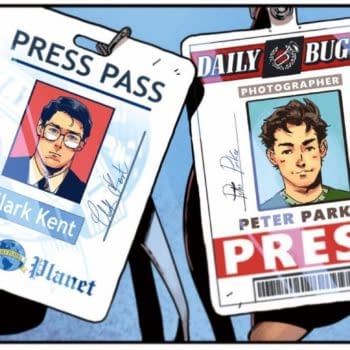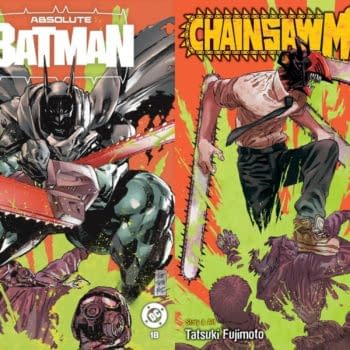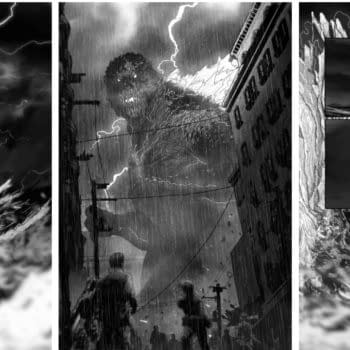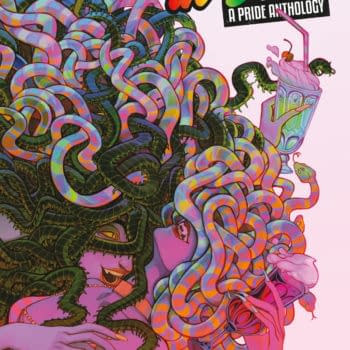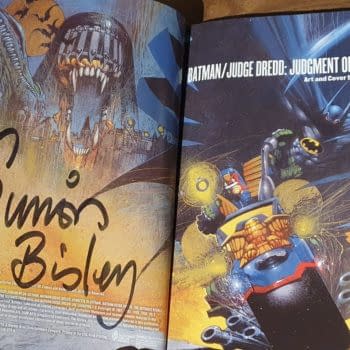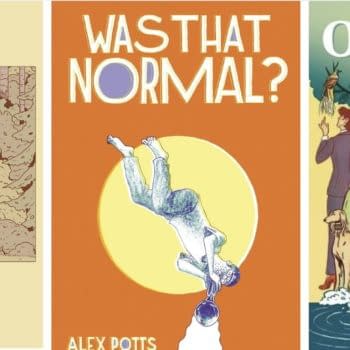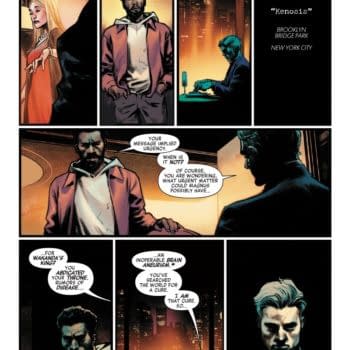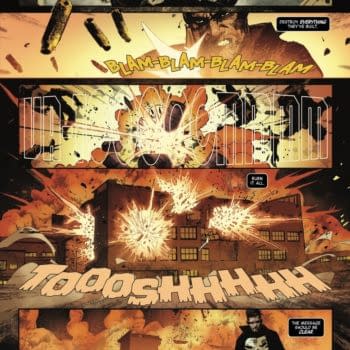Posted in: Comics | Tagged: Comics, david gallaher, entertainment, only living boy, steve ellis, The Only Living Boy, webcomic
David Gallaher And Steve Ellis – Talking To The Only Living Boys
Tomorrow at Noon, ET, The Only Living Boy by David Gallaher and Steve Ellis launch the full free webcomic The Only Living Boy at olbcomic.com.
We chatted about the comic, its origins and what it means… for, you know. Stuff.
Rich Johnston: The Only Living Boy… In New York or New Cross?
David Gallaher: Both. Absolutely New York, – our first pitch back in 2008 was actually called The Only Living Boy in New York. It was more a straight-up take on I Am Legend, which was filming in the city when I was working for the New York City Police Department. We brought two pages with us to San Diego Comic Con that year and, while it was a lot of fun to show around, we were hip-deep in producing High Moon weekly at the time. Since our story does take place in New York…the edge goes to the Simon and Garfunkel song.
But, I'm a child of the 90s, and was a big Carter USM fan – dating back to "Sheriff Fatman" – and so yes, "The Only Living Boy in New Cross" was something that crossed my mind while putting this series together. Thematically, pieces of that song litter the canvas of our story. We've got our share of "gypsies, travelers and thieves" in The Only Living Boy. They all play crucial roles in telling our story.
Around the spring of 2010, we started pushing against the barriers of our pitch. I'm a big fan of isolation fiction – like in Knock, I Am Legend, and The Last Man On Earth – but when we looked at what we had, we realized that there was an opportunity to tell a much larger story; something akin to a children's storybook but for young adults. Also, Steve likes to draw dragons.
Steve Ellis: There's a certain appeal about "lone survivor" fiction – taking a human character and surrounding them with a menagerie of crazy creatures can be seen in everything from The Jungle Book and Tarzan to Flash Gordon and John Carter. We're following in that pulp tradition but looking to do something different with it. We're taking a hodge-podge of nostalgic elements and screwing them up to tell a story about growing up lost and misunderstood.
It's a story about loneliness – and ultimately freedom. It really all goes back to the most basic feeling of human beings in the world – loneliness. It's very primal – dare I say, Jungian? – Trying to connect with a world we don't understand. We all come from the womb, connected to another human being. When we are born, we are let loose into the world. We're all alone – in our individual flesh-bag bodies – the connections we make with others is tenuous, at best. No matter how we look at it, it always ends. We end up alone, but we still all want to be loved and understood.
RJ: Kamandi or The Real Adventure Time?
DG: Neither. I didn't grow up reading Kamandi so it's not really in my frame of reference. If anything, maybe we both are inspired by Planet of the Apes, but I think there's were the similarities sorta end; at least in terms of our influences and intentions. I love Adventure Time – especially the rubberiness of the world, the tragic story of the Ice King, and those amazing songs by Rebecca Sugar – but again, it's not an influence. There is quite a bit of The Jungle Book though.
RJ: Both of you seem to have orbited the comics industry for some time, a project here, a project there, but nothing that seems to have gained traction in placing you in the readers eye – which others have come on board and leapfrogged you, in that manner at least. The Kieron Gillens, the James Tynions, the Justin Jordans, the Margerite Bennetts, the Kurtis J Wiebe's…is this a problem for you?
DG: All the talented creators you mentioned – and I love them all – are working on some of the most inventive books in the industry now. Heck, you could add Charles Soule, Jim Zub, Ales Kot, and Frank J. Barbiere to that list of young-gun creators doing remarkable things with comics. But…
We aren't competing with them – we're competing with ourselves. Every creator-owned project we've done has either won or been nominated for multiple awards. We had 2.7 million views for High Moon accumulated over three years. That doesn't include the tens of thousands of people who downloaded it on Sony PSP or ComiXlogy. We've got readers in Brazil, Spain, Italy, Paris – and yesterday – I discovered a fan translation of the series in Russian.
But as successful as High Moon has been, we want The Only Living Boy to be even more successful; both creatively and in terms of reaching new readers.
SE: We've learned over the years that what we want to produce and what our fans want to read is different than what mainstream publishers want to publish. For us, the traditional comic shop model doesn't reach a wide enough audience. And rather than limit ourselves, we've just decided to give ourselves more space to grow.
DG: We've also really enjoyed experimenting with form and content delivery across platforms and channels. Steve has taken the experience from High Moon and Box 13 and brought it to AMC, developing games and comics for Breaking Bad and The Walking Dead. I just finished work on a network TV show and, over the winter season, we worked together on a film project that will be announced shortly.
SE: We were asked to pitch a lot of digital projects to one of the Big Two a few years back. We love the characters and it would be fun to work with them. But for us, it's about finding authentic stories to tell with the characters in a creative-driven environment. I'd rather tell "The Greatest Story Never Told" with an underused character or tell fun out-of-continuity stuff.
RJ: There seem to be lots of creators yearning for a golden age of comics, bemoaning the lack of anything with classic action adventure for the youth. Battling Boy, Princeless, let alone licenses such as Adventure Time – there seems to be a fair few around right now…do you guys talk to each other?
SE: I really think that there needs to be a wide breathe of stories in comics for it to be a medium and not just superheroes. What I see every time I enter a bookstore is the portion of the direct market that isn't being serviced. I have an 11-year son and I would never let him read anything that some publishers are putting out because the material is too mature. That may be naive of me, but he's not ready for it. I grew up reading comics at his age, but where are the books for him? I don't want to come across as an angry parent – I'm willing to be wrong. But, my observation is that there's certainly a hunger for the material. It's illogical not to work cross-generationally, appealing to all sort of readers.












